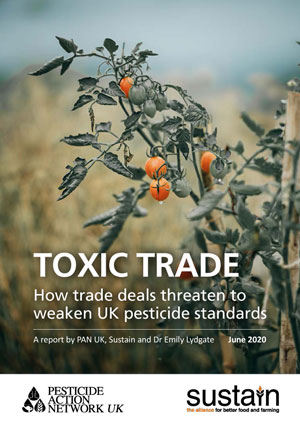Reports • Sustainable Farming Campaign
Toxic Trade: How trade deals threaten to weaken UK pesticide standards
This is the first of a series of 'Toxic Trade' reports and it compares existing UK pesticide standards with those of the US, Australia and India. The report highlights that Free Trade Agreements (FTAs) with these countries pose a significant threat to consumer protection, as well as to human health and the environment. It provides a set of recommendations and specific language for use in developing FTAs so that pesticide standards are maintained.
The second report, released in June 2021, covers the UK accession to the Comprehensive and Progressive Trans Pacific Partnership and is available here.
The third report, released in February 2022, reveals that ongoing trade discussions between the UK and Brazil are likely to lead to an increase in pesticide-related harms in both countries and is available here.
The fourth report, released in October 2022, covers the proposed Free Trade Agreement between the UK and India and is available here.
While far from perfect, UK pesticide standards are some of the strongest in the world. However a key priority for the US in particular is to weaken these protections. If this happens there will be larger amounts of more toxic pesticides in UK food. Pesticides that the UK has banned for environmental reasons, such as bee-toxic neonicotinoids, also risk being reauthorised.
Not only would this be disastrous for British farmers who would be undermined by imports produced to poorer standards, it would also be extremely unpopular with the British public. Recent YouGov polling reveals that 79% of people are concerned about impacts to health if a future UK/US deal involved lowering our pesticide standards; and 77% are worried about negative impacts on the environment.
There has been much public uproar about the UK lowering its food standards via a trade deal with the US to accept ‘chlorinated-chicken’. However, the risks related to pesticides are equally significant and concerning and yet the issue remains largely unnoticed.
Published Tuesday 9 June 2020
Sustainable Farming Campaign: Sustain encourages integration of sustainable food and farming into local, regional and national government policies.
